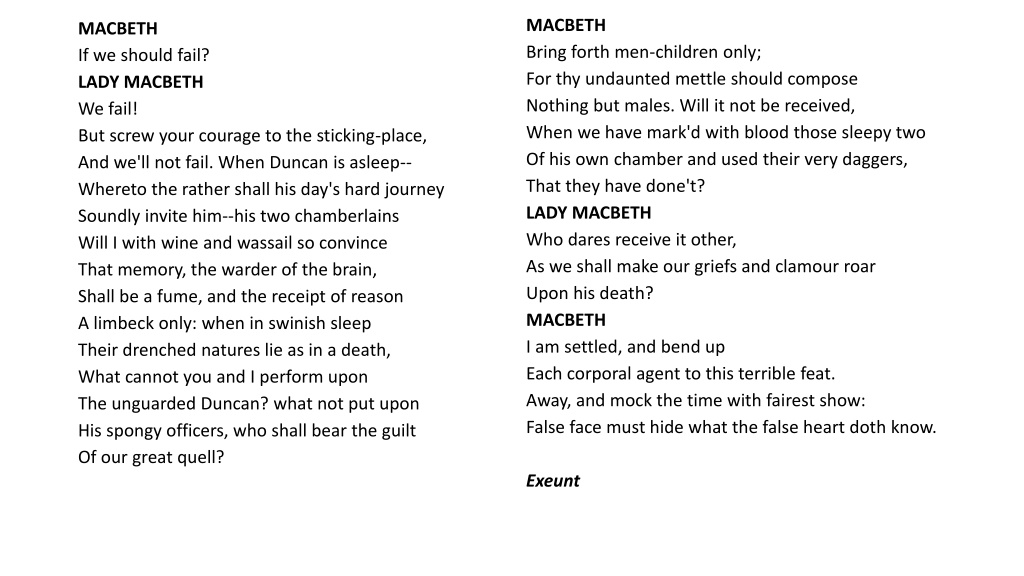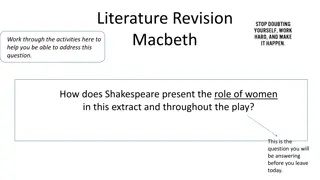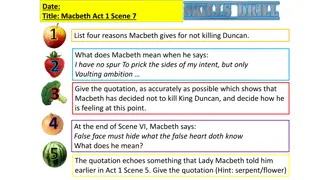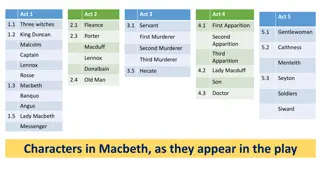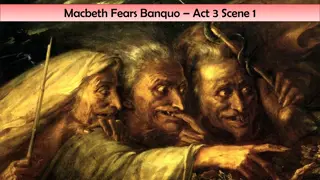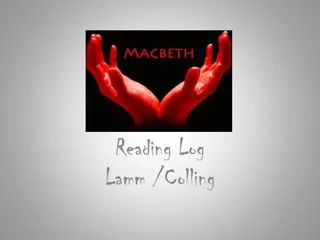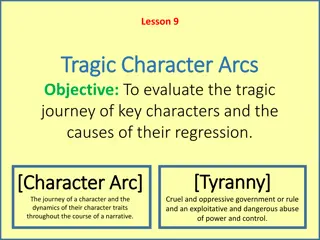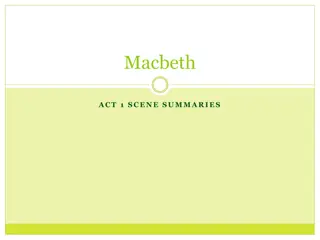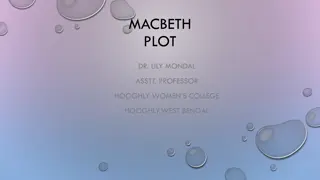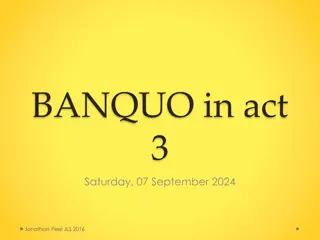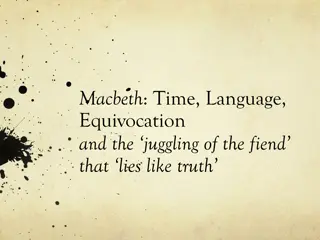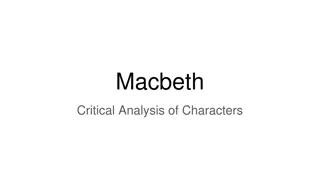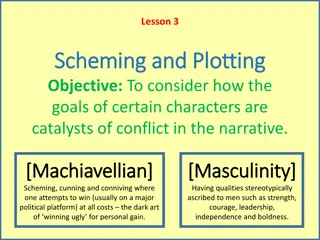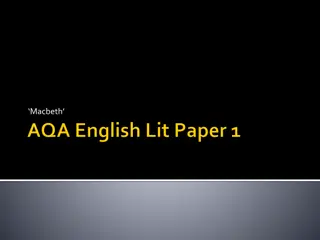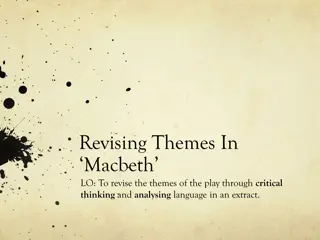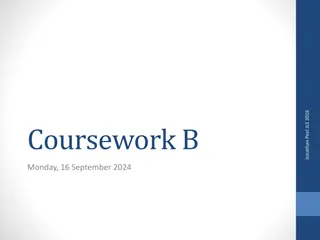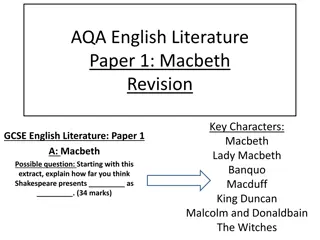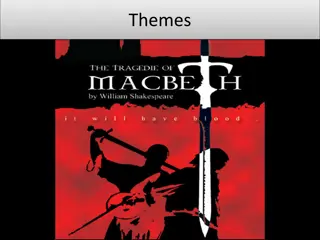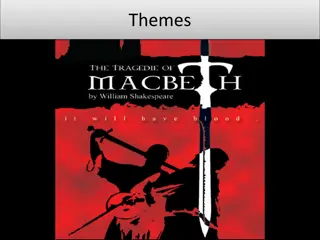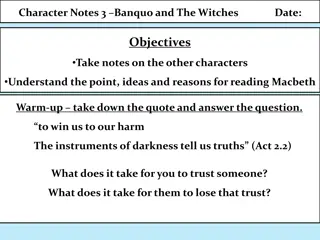Deceit in Shakespeare's "Macbeth
Shakespeare masterfully portrays the theme of deceit through Lady Macbeth's persuasive language and Macbeth's ruthless ambition in planning Duncan's murder. The extract reveals their cunning strategies, with vivid imagery used to mask their true intentions. This theme of deceit is prevalent throughout the play, shaping the characters' choices and leading to tragic consequences.
Download Presentation

Please find below an Image/Link to download the presentation.
The content on the website is provided AS IS for your information and personal use only. It may not be sold, licensed, or shared on other websites without obtaining consent from the author. Download presentation by click this link. If you encounter any issues during the download, it is possible that the publisher has removed the file from their server.
E N D
Presentation Transcript
MACBETH Bring forth men-children only; For thy undaunted mettle should compose Nothing but males. Will it not be received, When we have mark'd with blood those sleepy two Of his own chamber and used their very daggers, That they have done't? LADY MACBETH Who dares receive it other, As we shall make our griefs and clamour roar Upon his death? MACBETH I am settled, and bend up Each corporal agent to this terrible feat. Away, and mock the time with fairest show: False face must hide what the false heart doth know. MACBETH If we should fail? LADY MACBETH We fail! But screw your courage to the sticking-place, And we'll not fail. When Duncan is asleep-- Whereto the rather shall his day's hard journey Soundly invite him--his two chamberlains Will I with wine and wassail so convince That memory, the warder of the brain, Shall be a fume, and the receipt of reason A limbeck only: when in swinish sleep Their drenched natures lie as in a death, What cannot you and I perform upon The unguarded Duncan? what not put upon His spongy officers, who shall bear the guilt Of our great quell? Exeunt
Starting with this extract, how does Shakespeare present the theme of deceit? Write about: How Shakespeare presents the theme of deceit through in this extract How Shakespeare presents the theme of deceit in the play as a whole
How = STAR for analysis Present = which methods Close analysis of the extract you are given The theme to focus on Starting with this extract, how does Shakespeare present the theme of deceit? Write about: How Shakespeare presents the theme of deceit through in this extract How Shakespeare presents the theme of deceit in the play as a whole Use the extract to gain as many initial marks as you can for AO2 close analysis Place the extract in context: what s just happened? What s about to happen? Play as a whole: find 4 moments from the play that match the theme Write about them in chronological order to remember STRUCTURE points you can make
LM uses vivid imagery to persuade M of the deceitful plan MACBETH Bring forth men-children only; For thy undaunted mettle should compose Nothing but males. Will it not be received, When we have mark'd with blood those sleepy two Of his own chamber and used their very daggers, That they have done't? LADY MACBETH Who dares receive it other, As we shall make our griefs and clamour roar Upon his death? MACBETH I am settled, and bend up Each corporal agent to this terrible feat. Away, and mock the time with fairest show: False face must hide what the false heart doth know. MACBETH If we should fail? LADY MACBETH We fail! But screw your courage to the sticking-place, And we'll not fail. When Duncan is asleep-- Whereto the rather shall his day's hard journey Soundly invite him--his two chamberlains Will I with wine and wassail so convince That memory, the warder of the brain, Shall be a fume, and the receipt of reason A limbeck only: when in swinish sleep Their drenched natures lie as in a death, What cannot you and I perform upon The unguarded Duncan? what not put upon His spongy officers, who shall bear the guilt Of our great quell? Image spongy absorb drink and the guilt/blame LM answers M s doubt we will roar our grief to deceive. Rhetorical Question M agrees to the false and deceitful behaviour: must modal verb Exeunt
Other moments that match deceit Witches prophecies are deceitful stars hide your fires : Macbeth speaks inwardly to show the audience only his true desires Lady Macbeth and Macbeth: their relationship is destroyed through their deceit Macbeth begins to deceive his wife: Banquo and Macduff family murders Higher level: Plot to rid Scotland of Macbeth Soldiers use branches to hide Deceit leads to further deceit Conclusion: deceit of the Macbeths is not rewarded in the play, deceit is needed to save Scotland.
SERGEANT For brave Macbeth--well he deserves that name-- Disdaining fortune, with his brandish'd steel, Which smoked with bloody execution, Like valour's minion carved out his passage Till he faced the slave; Which ne'er shook hands, nor bade farewell to him, Till he unseam'd him from the nave to the chaps, And fix'd his head upon our battlements. DUNCAN O valiant cousin! worthy gentleman! Sergeant As whence the sun 'gins his reflection Shipwrecking storms and direful thunders break, So from that spring whence comfort seem'd to come Discomfort swells. Mark, king of Scotland, mark: No sooner justice had with valour arm'd Compell'd these skipping kerns to trust their heels, But the Norweyan lord surveying vantage, With furbish'd arms and new supplies of men Began a fresh assault. DUNCAN Dismay'd not this Our captains, Macbeth and Banquo? SERGEANT Yes; As sparrows eagles, or the hare the lion. If I say sooth, I must report they were As cannons overcharged with double cracks, so they Doubly redoubled strokes upon the foe: Except they meant to bathe in reeking wounds, Or memorise another Golgotha, I cannot tell.
Starting with this extract, how far does Shakespeare present Macbeth as a brave character? Write about: How Shakespeare presents Macbeth in this extract How Shakespeare presents Macbeth in the play as a whole
How = STAR for analysis Present = which methods Close analysis of the extract you are given The theme to focus on Starting with this extract, how far does Shakespeare present Macbeth as a brave character? Write about: How Shakespeare presents Macbeth in this extract How Shakespeare presents Macbeth in the play as a whole Use the extract to gain as many initial marks as you can for AO2 close analysis Place the extract in context: what s just happened? What s about to happen? Play as a whole: find 4 moments from the play that match the theme Write about them in chronological order to remember STRUCTURE points you can make
SERGEANT For brave Macbeth--well he deserves that name-- Disdaining fortune, with his brandish'd steel, Which smoked with bloody execution, Like valour's minion carved out his passage Till he faced the slave; Which ne'er shook hands, nor bade farewell to him, Till he unseam'd him from the nave to the chaps, And fix'd his head upon our battlements. DUNCAN O valiant cousin! worthy gentleman! Sergeant As whence the sun 'gins his reflection Shipwrecking storms and direful thunders break, So from that spring whence comfort seem'd to come Discomfort swells. Mark, king of Scotland, mark: No sooner justice had with valour arm'd Compell'd these skipping kerns to trust their heels, But the Norweyan lord surveying vantage, With furbish'd arms and new supplies of men Began a fresh assault. DUNCAN Dismay'd not this Our captains, Macbeth and Banquo? SERGEANT Yes; As sparrows eagles, or the hare the lion. If I say sooth, I must report they were As cannons overcharged with double cracks, so they Doubly redoubled strokes upon the foe: Except they meant to bathe in reeking wounds, Or memorise another Golgotha, I cannot tell.
Other moments that match Macbeth as brave Brave to carry out the plan to kill the King? Brave ambition? Brave returning to the witches Bravery from the prophecies false bravery? Brave or foolhardy at the end in battle Expected bravery from his wife masculine bravery Cowardly behaviour after killing the King and seeing Banquo s ghost, doesn t carry out further murders himself Conclusion: Macbeth introduced as brave and loyal, easily manipulated though, ambitious but this is his fatal flaw.
